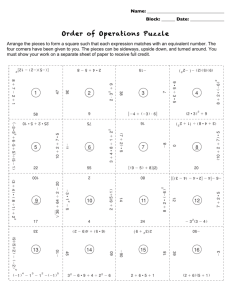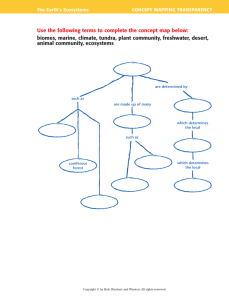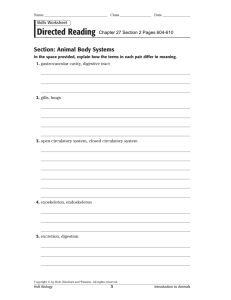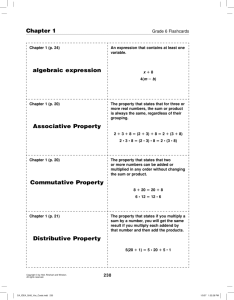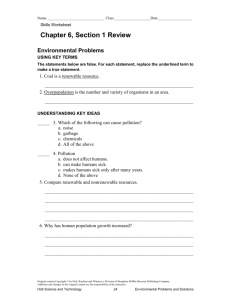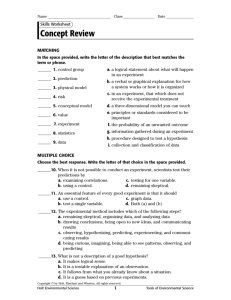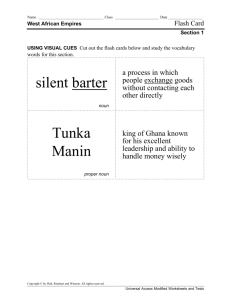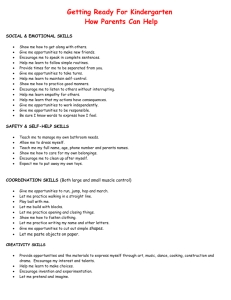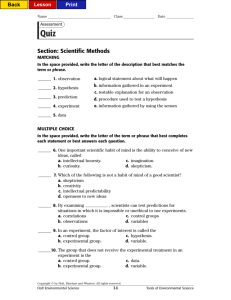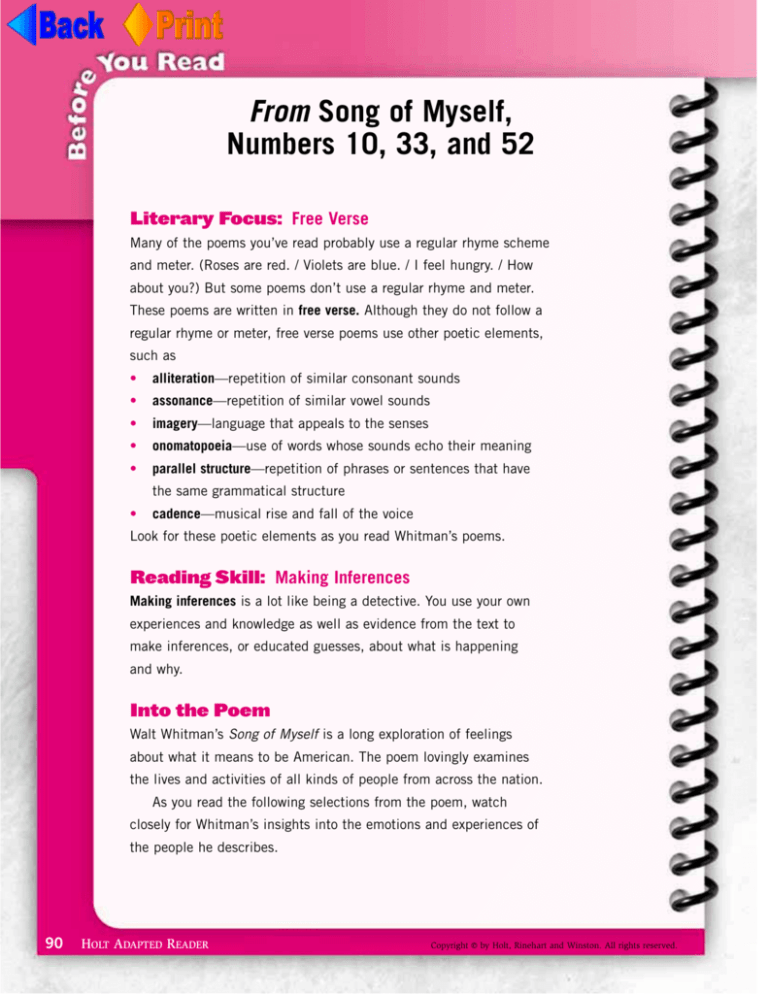
From Song of Myself,
Numbers 10, 33, and 52
Literary Focus: Free Verse
Many of the poems you’ve read probably use a regular rhyme scheme
and meter. (Roses are red. / Violets are blue. / I feel hungry. / How
about you?) But some poems don’t use a regular rhyme and meter.
These poems are written in free verse. Although they do not follow a
regular rhyme or meter, free verse poems use other poetic elements,
such as
•
alliteration—repetition of similar consonant sounds
•
assonance—repetition of similar vowel sounds
•
imagery—language that appeals to the senses
•
onomatopoeia—use of words whose sounds echo their meaning
•
parallel structure—repetition of phrases or sentences that have
the same grammatical structure
•
cadence—musical rise and fall of the voice
Look for these poetic elements as you read Whitman’s poems.
Reading Skill: Making Inferences
Making inferences is a lot like being a detective. You use your own
experiences and knowledge as well as evidence from the text to
make inferences, or educated guesses, about what is happening
and why.
Into the Poem
Walt Whitman’s Song of Myself is a long exploration of feelings
about what it means to be American. The poem lovingly examines
the lives and activities of all kinds of people from across the nation.
As you read the following selections from the poem, watch
closely for Whitman’s insights into the emotions and experiences of
the people he describes.
90
HOLT ADAPTED READER
Copyright
© by Holt, Rinehart and Winston. All rights reserved.
Walt Whitman
Copyright
© by Holt, Rinehart and Winston. All rights reserved.
SONG
OF
MYSELF
91
YOU NEED TO KNOW
In Song of Myself, the poet
Walt Whitman shares in the thoughts and feelings of a variety
of American characters, from slaves to military generals.
Whitman felt that looking into the lives of other
Americans could connect citizens to each other in a powerful
way. He wanted Americans to see their nation as a single,
FREE VERSE
wonderful whole.
In lines 1—5, I see that the poem
does not rhyme or have a
regular meter. What other
elements of poetry does it have?
Ah, I see that lines 2, 4, and 5
have parallel structure——they all
start with the same part of
speech.
10
Alone far in the wilds and mountains I hunt,
Wandering amazed at my own lightness and glee,
In the late afternoon choosing a safe spot to pass the night,
Kindling1 a fire and broiling the fresh-kill’d game,2
Falling asleep on the gather’d leaves with my dog and gun by my
side.
5
MAKING INFERENCES
The Yankee clipper is under her sky-sails,3 she cuts the sparkle
I didn’t understand why someone
would lean over the front of
the ship or shout from its deck
(line 7). Then I asked myself, “What
would make me act that way?” My
answer is this: Being really happy
to see land again. I guess the
sailor’s been at sea for a long,
long time. Now he’s happy to be
close to shore again.
and scud,4
My eyes settle the land, I bend at her prow5 or shout joyously from
the deck.
The boatmen and clam-diggers arose early and stopt for me,
I tuck’d my trowser-ends in my boots and went and had a good
time;
10
You should have been with us that day round the chowder-kettle.
IN OTHER WORDS
First, the speaker adopts the
voice of a hunter. Although he hunts alone, he is amazed at
how happy he is. He enjoys his simple life in the wilderness.
Next, the speaker adopts the voice of a seaman. He
shouts joyfully when he sees land. Later, he and other sailors
have an excellent time together and at dinner.
1.
2.
3.
4.
5.
92
HOLT ADAPTED READER
kindling: setting a fire.
game: wild animals hunted for food or sport.
sky-sails: small sails atop a ship’s mast.
scud: windblown sea spray or foam.
her prow: the pointed front of the ship.
Copyright
© by Holt, Rinehart and Winston. All rights reserved.
I saw the marriage of the trapper in the open air in the far west,
the bride was a red girl,
Her father and his friends sat near cross-legged and dumbly
smoking, they had moccasins6 to their feet and large thick
blankets hanging from their shoulders,
On a bank lounged the trapper, he was drest mostly in skins, his
luxuriant beard and curls protected his neck, he held his bride
by the hand,
She had long eyelashes, her head was bare, her coarse straight
locks7 descended upon her voluptuous limbs and reach’d to
her feet.
15
The runaway slave came to my house and stopt outside,
I heard his motions crackling the twigs of the woodpile,
Through the swung half-door of the kitchen I saw him limpsy8 and
MAKING INFERENCES
Why does the speaker say
that the bride was “red” in
line 11? I remember some things
we learned in social studies class.
People used to say Native
Americans had red skin. Also,
many of the first Europeans to
head west were fur trappers.
I’ll bet that’s what’s happening.
A fur trapper is marrying a
Native American girl he met in
the western mountains.
weak,
And went where he sat on a log and led him in and assured him,
And brought water and fill’d a tub for his sweated body and
bruis’d feet,
And gave him a room that enter’d from my own, and gave him
some coarse clean clothes,
20
And remember perfectly well his revolving eyes and his
MAKING INFERENCES
Underline the clues in lines
15–24 that tell you that the
runaway slave’s journey north
has been difficult and
dangerous.
awkwardness,
And remember putting plasters9 on the galls10 of his neck and
ankles;
He stayed with me a week before he was recuperated11 and
pass’d north,
I had him sit next me at table, my fire-lock12 lean’d in the corner.
6.
7.
8.
9.
10.
11.
12.
Copyright
FREE VERSE
A poetic element often used in
free verse is alliteration—the
repetition of consonant sounds
in nearby words. What sound
is most often repeated in
lines 21–23? Write it below,
and then circle all the words
that begin with that sound:
moccasins (MOK uh suhnz): soft shoes made of deer leather.
locks: hair.
limpsy: limp; exhausted.
plasters: medical ointment spread on a cloth, used to relieve pain.
galls: sores.
recuperated (rih KYOO puh rayt uhd): restored to health.
fire-lock: gun, such as a flintlock.
© by Holt, Rinehart and Winston. All rights reserved.
SONG
OF
MYSELF
93
IN OTHER WORDS
First,
the
speaker
tells
of
watching the outdoor wedding of a fur trapper and a Native
American girl. He describes the bride’s father, the wedding
guests, and the groom and bride.
Next, he talks about finding an escaped slave outside his
home. He brings the runaway slave inside, allows him to
MAKING INFERENCES
wash, and gives him a room in which to stay. He helps the
In line 4, the speaker says the
skipper “knuckled tight and gave
not back an inch.” That’s kind of
weird. So I thought about times
when my own knuckles got tight.
Right away I remembered riding
a roller coaster last summer.
I grabbed the bar and held on
so tightly that my knuckles
turned white. I’ll bet that’s what
he means: The sea’s throwing the
ships around like roller-coaster
cars, but the skipper is hanging
on tight, refusing to give up.
runaway slave recover from his wounds, gives him clean
clothes, and feeds him. After a week, the man continues his
journey north.
from 33
I understand the large hearts of heroes,
The courage of present times and all times,
How the skipper saw the crowded and rudderless1 wreck of the
steam-ship, and Death chasing it up and down the storm,
How he knuckled tight and gave not back an inch, and was
faithful of days and faithful of nights,
And chalk’d in large letters on a board, Be of good cheer, we will
MAKING INFERENCES
not desert you;
5
How he follow’d with them and tack’d2 with them three days and
In lines 1–9, the speaker
describes the brave actions of a
sea captain. Then, in line 11,
he says, “I am the man, I
suffer’d, I was there.” Do you
think the speaker was really
there, or does he mean
something else? What do you
think he means?
would not give it up,
How he saved the drifting company at last,
How the lank3 loose-gown’d women look’d when boated from the
side of their prepared graves,
How the silent old-faced infants and the lifted sick, and the sharplipp’d unshaved men;
10
All this I swallow, it tastes good, I like it well, it becomes mine,
I am the man, I suffer’d, I was there.4
1.
2.
3.
4.
94
HOLT ADAPTED READER
rudderless: missing the steering portion of the ship.
tack’d: sailed against the wind in a zigzag course.
lank: slender.
I understand . . . I was there: A copy of a newspaper story about a similar incident was
found among Whitman’s papers after his death. A violent storm hit a ship, washing many
passengers overboard. The captain of another ship helped rescue the survivors.
Copyright
© by Holt, Rinehart and Winston. All rights reserved.
IN OTHER WORDS
The speaker says he understands
heroism. He tells the story of a wrecked ship. Despite a
dangerous storm, another ship followed it for three days. The
captain of the rescuing ship held up a sign telling people
aboard the wreck that he would stay with them. The speaker
knows what the passengers and crew experienced.
FREE VERSE
The disdain5 and calmness of martyrs,6
The mother of old, condemn’d for a witch, burnt with dry wood,
Underline the clues in line 13
that tell you how and why the
“mother of old” died.
her children gazing on,
The hounded slave that flags7 in the race, leans by the fence,
blowing, cover’d with sweat,
The twinges that sting like needles his legs and neck, the
murderous buckshot8 and the bullets,
15
All these I feel or am.
I am the hounded slave, I wince at the bite of the dogs,
FREE VERSE
Assonance—repetition of
similar vowel sounds in nearby
words—is another element of
poetry often found in free
verse. Circle the examples of
assonance in line 16.
Hell and despair are upon me, crack and again crack the
marksmen,
I clutch the rails of the fence, my gore dribs,9 thinn’d with the
ooze of my skin,
20
I fall on the weeds and stones,
The riders spur their unwilling horses, haul close,
Taunt my dizzy ears and beat me violently over the head with
whip-stocks.
FREE VERSE
Parallel structure is a common
element of Whitman’s poetry.
Underline the repeated
grammatical structures in lines
17, 19, and 20.
Agonies are one of my changes of garments,
I do not ask the wounded person how he feels, I myself become
the wounded person,
25
My hurts turn livid10 upon me as I lean on a cane and observe.
5.
6.
7.
8.
9.
10.
Copyright
disdain (dihs TAYN): scorn.
martyrs (MAHR tuhrz): people put to death for their beliefs.
flags: grows weak and tired.
buckshot (BUHK shot): lead shot used to shoot large animals.
gore dribs: dribbles of thick blood.
livid (LIHV ihd): pale or black and blue, the color of a bruise.
© by Holt, Rinehart and Winston. All rights reserved.
SONG
OF
MYSELF
95
I am the mash’d fireman with breast-bone broken,
Tumbling walls buried me in their debris,11
Heat and smoke I inspired,12 I heard the yelling shouts of my
comrades,
I heard the distant click of their picks and shovels,
30
They have clear’d the beams away, they tenderly lift me forth.
FREE VERSE
One of the poetic elements I
learned about is imagery.
Lines 26—30 have images that
appeal to three different senses.
I see the wounded fireman buried
under fallen walls. I feel the heat
and smoke. I hear the shouts and
the clicks of the shovels. And I
feel friends lifting gently.
I lie in the night air in my red shirt, the pervading hush is for my
sake,
Painless after all I lie exhausted but not so unhappy,
White and beautiful are the faces around me, the heads are
bared of their fire-caps,
The kneeling crowd fades with the light of the torches.
35
Distant and dead resuscitate,13
They show as the dial or move as the hands of me, I am the
clock myself.
MAKING INFERENCES
In this poem, Whitman
frequently repeats the phrase
“I am” (lines 11, 17, 26, 37,
38) when he describes very
different people. What idea do
you think he is emphasizing
with this repetition?
I am an old artillerist,14 I tell of my fort’s bombardment,15
I am there again.
Again the long roll of the drummers,
40
Again the attacking cannon, mortars,16
Again to my listening ears the cannon responsive.
I take part, I see and hear the whole,
The cries, curses, roar, the plaudits17 for well-aim’d shots,
The ambulanza slowly passing trailing its red drip,
Workmen searching after damages, making indispensable
FREE VERSE
I can find two elements of poetry
in lines 39—41. There is parallel
structure in the repetition of
“Again,” and there is alliteration in
the r sounds in “roll,”
“drummers,” “mortars,” and
“responsive.” Both these
elements help create the sense
of the guns firing and the drums
banging.
96
HOLT ADAPTED READER
repairs,
45
The fall of grenades through the rent roof, the fan-shaped
explosion,
The whizz of limbs, heads, stone, wood, iron, high in the air.
11.
12.
13.
14.
15.
16.
17.
debris (duh BREE): scattered pieces.
inspired: breathed.
resuscitate (rih SUHS uh tayt): revive.
artillerist (ahrt IHL uhr ihst): soldier with the artillery, gunner.
bombardment (bom BAHRD muhnt): bombing with artillery shells.
mortars (MAWR tuhrz): short cannons.
plaudits (PLAW dihtz): expressions of support.
Copyright
© by Holt, Rinehart and Winston. All rights reserved.
Again gurgles the mouth of my dying general, he furiously waves
with his hand,
He gasps through the clot Mind not me—mind—the
entrenchments.18
IN OTHER WORDS
The speaker describes the courage
of martyrs, people who have suffered and died for a cause.
He tells of a woman burned as a witch. Then he describes the
agonies of a runaway slave who has been shot and beaten to
death. He talks of a fireman who has been killed by a falling
FREE VERSE
Onomatopoeia is the use of
words whose sounds echo their
meaning. Circle the examples
of onomatopoeia in the two
lines at the top of the page.
wall, and he describes his funeral. Finally, he tells the story
of a dying general. As one of the general’s men tries to help
him, the general scolds the soldier, telling him to worry about
VOCABULARY
the battle, instead.
52
The spotted hawk swoops by and accuses me, he complains of my
gab and my loitering.1
I too am not a bit tamed, I too am untranslatable,
I sound my barbaric yawp over the roofs of the world.
Line 3 confused me at first. Then
I realized that sound is being
used as an action word. Here
sound means “to make a noise.”
Then I thought about hawks’ loud,
screeching sounds. I’ll bet he’s
saying his poetry makes loud,
screeching noises, just as a hawk
does.
The last scud2 of day holds back for me,
It flings my likeness after the rest and true as any on the
shadow’d wilds,
5
It coaxes me to the vapor and the dusk.
I depart as air, I shake my white locks at the runaway sun,
I effuse3 my flesh in eddies,4 and drift it in lacy jags.5
MAKING INFERENCES
In lines 9 and 10, the speaker
says that he’s leaving himself
to the dirt and grass. Then he
says that we’ll have to look for
him under our own feet. What
do you think he means?
I bequeath6 myself to the dirt to grow from the grass I love,
10
If you want me again look for me under your boot-soles.
18.
1.
2.
3.
4.
5.
6.
Copyright
entrenchments (ehn TRENCH muhntz): defensive position within trenches.
loitering (LOY tuhr ihng): lazy or frivolous lingering.
scud: windblown sea spray or foam.
effuse (ih FYOOZ): pour out.
eddies: small whirlpools.
jags: uneven tears, as in cloth.
bequeath (bih KWEETH): entrust, leave.
© by Holt, Rinehart and Winston. All rights reserved.
SONG
OF
MYSELF
97
You will hardly know who I am or what I mean,
But I shall be good health to you nevertheless,
And filter and fiber your blood.
Failing to fetch me at first keep encouraged,
15
FREE VERSE
How many consonant sounds
repeat in lines 13–16? Write
the sounds on the lines below.
Then, circle all the words in
those lines that show
alliteration.
Missing me one place search another,
I stop somewhere waiting for you.
IN OTHER WORDS
The speaker says that a hawk
objects to his meaningless talk and laziness. Then he points
out his similarities to the hawk. He is wild, hard to understand,
and shouts out to the world. He says that he is like the clouds
at sunset and like the soil under our feet, hardly noticed but
good for us all. He says that we may not catch him at first, but
we should keep looking for him. Finally, he says that he is out
there somewhere, waiting for us to meet him.
98
HOLT ADAPTED READER
Copyright
© by Holt, Rinehart and Winston. All rights reserved.
Song of Myself
Free Verse
Free verse does not follow a regular meter or rhyme scheme, but that
does not mean that anything goes. Free-verse poems contain many
other elements of poetry.
In the chart below, elements of poetry are listed in the left-hand
column. Quotations from “Song of Myself” are listed in the right-hand
column. Draw connecting lines showing which element of poetry each
quotation is an example of. Some quotes contain more than one
element. Choose the one you think the quote most strongly represents.
One has been done for you.
Element of Poetry
1. alliteration—repetition of similar
consonant sounds
2. assonance—repetition of similar
vowel sounds
3. imagery—language that appeals to
the senses
4. onomatopoeia—use of words whose
Quotation from “Song of Myself”
a. “The twinges that sting like needles
his legs and neck”
b. “The Yankee clipper is under her
sky-sails, she cuts the sparkle and
scud”
c. “I am an old artillerist, I tell of my
fort’s bombardment,/I am there
again.”
d. “I effuse my flesh in eddies”
sounds echo their meaning
5. parallel structure—repetitions of
phrases or sentences that have the
same grammatical structure
Copyright
© by Holt, Rinehart and Winston. All rights reserved.
e. “Hell and despair are upon me,
crack and again crack the
marksmen”
SONG
OF
MYSELF
99

